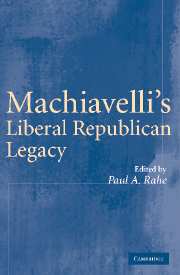Book contents
- Frontmatter
- Contents
- List of Contributors
- Acknowledgments
- Abbreviations and Brief Titles
- Introduction: Machiavelli's Liberal Republican Legacy
- Prologue: Machiavelli's Rapacious Republicanism
- PART I THE ENGLISH COMMONWEALTHMEN
- PART II THE MODERATE ENLIGHTENMENT
- PART III THE AMERICAN FOUNDING
- 7 The American Prince? George Washington's Anti-Machiavellian Moment
- 8 John Adams's Machiavellian Moment
- 9 Thomas Jefferson's Machiavellian Political Science
- 10 James Madison's Princes and Peoples
- 11 Was Alexander Hamilton a Machiavellian Statesman?
- Index
8 - John Adams's Machiavellian Moment
Published online by Cambridge University Press: 24 July 2009
- Frontmatter
- Contents
- List of Contributors
- Acknowledgments
- Abbreviations and Brief Titles
- Introduction: Machiavelli's Liberal Republican Legacy
- Prologue: Machiavelli's Rapacious Republicanism
- PART I THE ENGLISH COMMONWEALTHMEN
- PART II THE MODERATE ENLIGHTENMENT
- PART III THE AMERICAN FOUNDING
- 7 The American Prince? George Washington's Anti-Machiavellian Moment
- 8 John Adams's Machiavellian Moment
- 9 Thomas Jefferson's Machiavellian Political Science
- 10 James Madison's Princes and Peoples
- 11 Was Alexander Hamilton a Machiavellian Statesman?
- Index
Summary
Scholars have debated for many years the role that Machiavelli's ideas may or may not have played in the founding of the United States. Some argue that Machiavelli resurrected a lost tradition of classical republican theory and practice, which was then transmitted to America via the so-called Commonwealthmen of seventeenth- and eighteenth-century English politics. Others credit Machiavelli with having initiated a revolution in political thought that paved the way for the modern natural-rights teaching of Hobbes, Locke, and the American Revolution. And, of course, some deny that Machiavelli had any influence whatsoever in America.
Those who argue for an explicit Machiavellian connection are confronted by one massive problem: There is simply no tangible evidence to suggest that Machiavelli positively influenced any of the American founders. One searches in vain for a direct and recognizable link to Machiavelli in the writings of Jefferson, Madison, or Hamilton. Thus, much of the work on this question has attempted to show how certain Machiavellian ideas were distilled and culturally transmitted to America. In other words, we are led to believe that eighteenth-century Americans were Machiavellians without knowing it.
John Adams was an exception to the rule. He was unique among the founders in that he actually read and took seriously Machiavelli's ideas. Adams quoted extensively from Machiavelli, and he openly acknowledged an intellectual debt to the Florentine statesman. Adams even claimed to have been a “student of Machiavelli.” Adams's political writings are replete with references to Machiavelli and his writings.
- Type
- Chapter
- Information
- Machiavelli's Liberal Republican Legacy , pp. 189 - 207Publisher: Cambridge University PressPrint publication year: 2005



